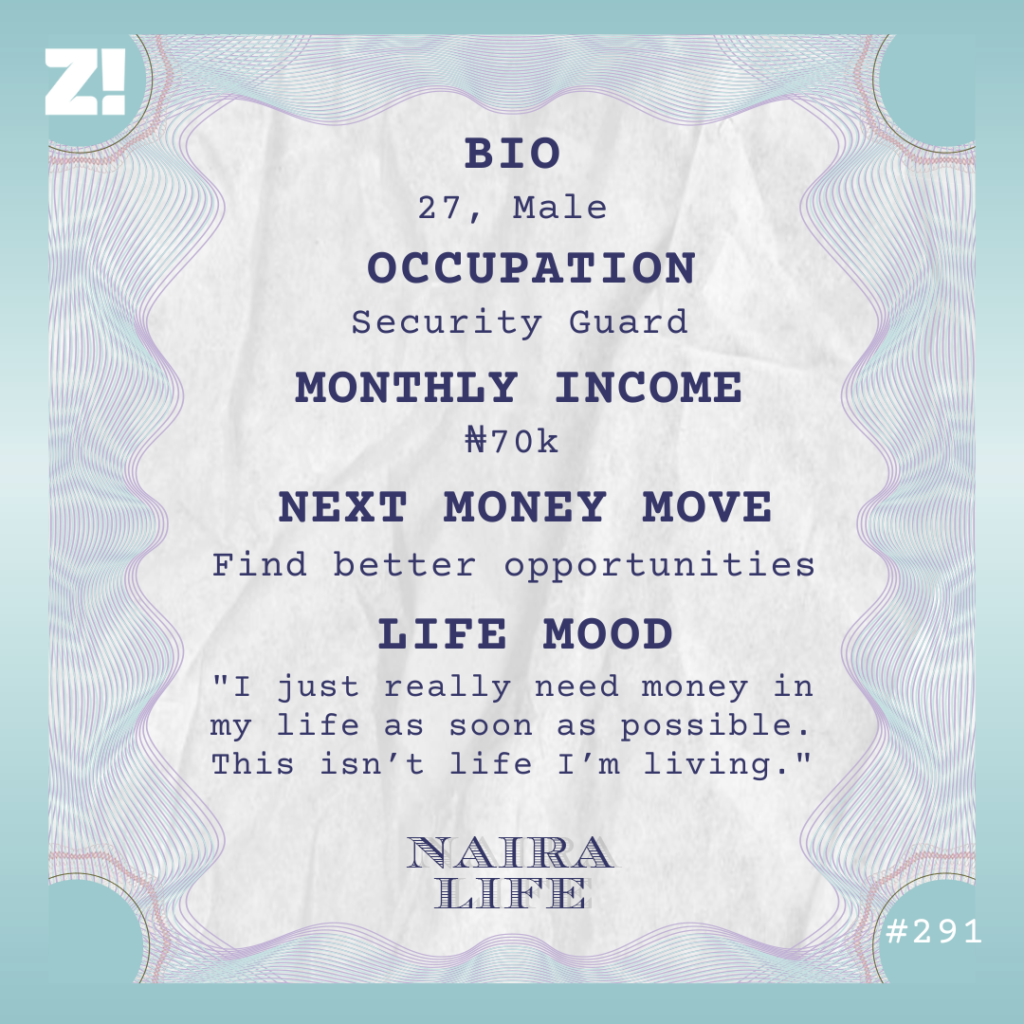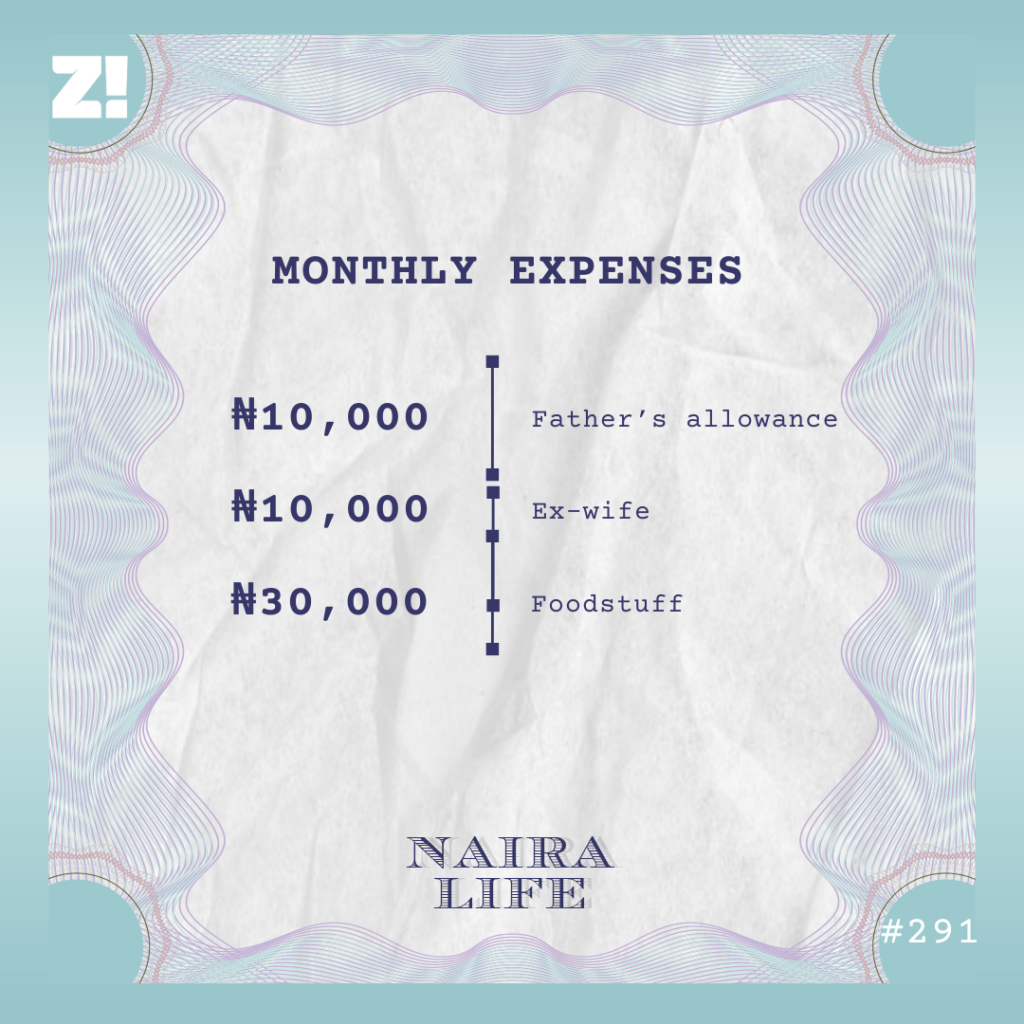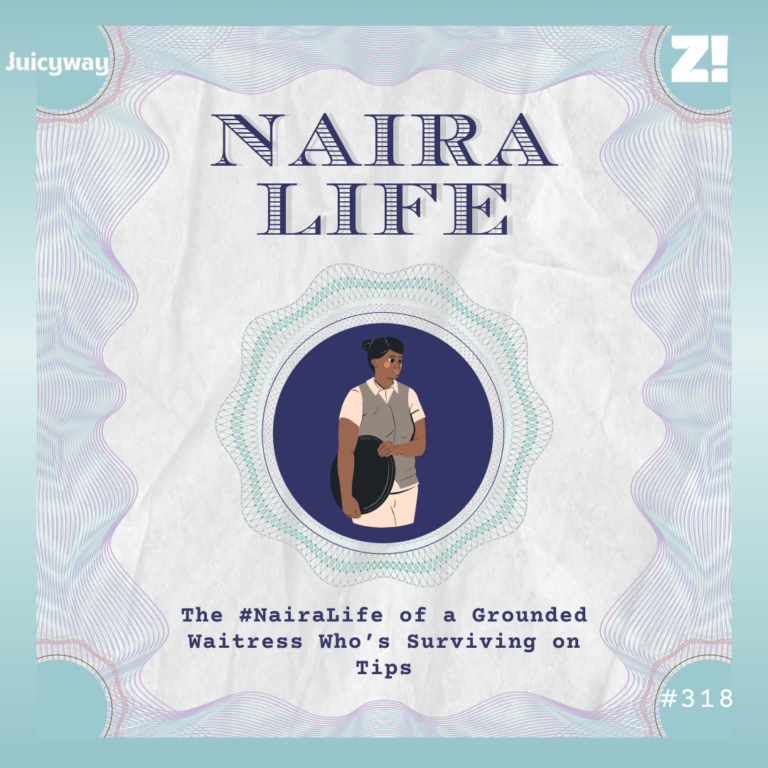Every week, Zikoko seeks to understand how people move the Naira in and out of their lives. Some stories will be struggle-ish, others will be bougie. All the time, it’ll be revealing.

How did you find yourself working as a security guard?
Ah. It’s a long story.
Let’s start from the top
I’ve been hustling since I was around 12 years old. My father was a butcher who couldn’t provide for his three wives and 11 children. So, my mother used what she made from her provisions store to take care of me and my three biological siblings. She didn’t make much, so I mostly paid my school fees myself.
How did you do that?
Different things. For example, when I was in JSS 2, I learnt how to repair phones from a friend. I also got into online business around that time. This was around 2012/2013.
What kind of online business?
Actually, it was yahoo yahoo — another friend introduced me to it. I was pretending to be oyinbo on Facebook and Instagram and chatting with oyinbo people. Some people have luck with this online work, but I didn’t make much from it. The lowest I made was $100, and the highest money I got at a time was $400.
I didn’t make money regularly, and the dollar exchange rate wasn’t up to ₦200 then, so I didn’t make big money. But it was enough for me to drop small money at home for foodstuff and pay my school fees.
I also didn’t regularly make money from my phone repair business because I didn’t have a shop. I just had a spot where I worked after school with my tools. My pay depended on whatever fault my customer’s phone had, but it was usually between ₦500 – ₦1k.
When I got to JSS 3, I decided I couldn’t continue school.
Why?
School fees. I just know I couldn’t afford it again. Things were tight.
From 2014 to 2020, I survived on what I made repairing phones and some financial support from a brother who was out of the country. I still lived with my parents, so I didn’t have many responsibilities. But after I got married in 2019, I realised I needed to do something more to bring more money home.
How did marriage happen?
It just happened. I’d been with my girlfriend since primary school, and getting married was the next step after she got pregnant. It wasn’t a proper wedding like that, more like an introduction ceremony. But a baby was coming, and I knew it’d increase my responsibilities, so I started looking for business ideas.
Were you still doing the “online business”?
I gradually stopped because it wasn’t really working. By 2020, I befriended one of my Facebook clients, and she also convinced me to stop. We became friends after she realised I wasn’t who I was pretending to be. I think she changed me. She said she didn’t want me to do yahoo anymore and even gave me $200.
When I added that money to some money I’d saved up, it was up to ₦200k. I decided to use it to start a wholesale provisions business.
Tell me how that went
I got a shop and made small sales here and there. But I really wanted to get a car. My major distributor was in a neighbouring state, and I always paid money to pick up the goods at the park. I figured that a car would allow me to drive down myself, cut out delivery costs and even buy more goods.
I joined a cooperative so I could borrow money to buy the car, but that wasn’t a good idea.
What happened?
First, I decided to get the car through my aunt. She said her husband knew much about cars, so I thought I was in good hands. Her husband initially told me the second-hand 1999 Toyota Camry would cost ₦1m. So, I took a ₦1m loan from the cooperative. But I got there and learned the car cost ₦150k more — the middleman was trying to add his own profit, but I didn’t have a choice. I had to borrow the balance from my aunt.
My biggest problem was that the car had issues. I didn’t know much about cars, so I didn’t notice until I started using the car. It was always one problem or the other, and I was just spending money repairing and repairing. I couldn’t even use it for the reason I bought it.
Remember I still had the loan to pay off? The car was supposed to bring more profit to my business so I could repay the loan. But the car’s problems forced me to sell it off after seven months. Problem number two.
People didn’t want to buy it?
They didn’t want to o. I wanted to sell it for ₦1.150m so I could get the money I paid back, but people kept pricing it at ₦500k. I eventually sold it at ₦800k.
I couldn’t use the whole amount to repay the loan — which was almost ₦1.3m plus interest — because my wife gave birth around that time, and there were a lot of expenses. I also had to put some of the money into my business to restock the shop.
Only half of that money from the car made it back to the cooperative. I had to repay the loan small small using both profit and capital from my business. It almost caused an issue with my aunty because she stood as guarantor for me and the cooperative people were on her neck, and she was on mine.
It took me two years to repay the loan, but my business was totally run down by that time. To top it all off, my wife had given birth to another baby.
Damn. So what did you do next?
I started looking for money again. My search took me to an online chat platform where people post jobs. That’s how I saw one promising to pay up to ₦100k/month to work in a hair factory in Lagos. So I packed my bags, left my family in Delta state and moved to Lagos in 2023.
Did you know anyone in Lagos?
An uncle, but I didn’t know where he lived. I could’ve asked my dad for the address, but I wanted to struggle on my own. You know, so I’d be able to say I made it without relying on anyone.
Anyway, the job wasn’t what I imagined. It wasn’t a fixed monthly pay job; the factory paid workers based on the number of tasks we completed daily. I’d work from 6:30 a.m. to 6 p.m. to make ₦700 – ₦800. They then recorded how much we made per day to determine the salary at the end of the month.
They created a bank account for me to receive my salary, but I didn’t even wait for the first salary. I just stopped showing up at the factory after a few weeks.
Just like that?
Just like that o. The work was stressful, and I couldn’t cope. While I worked at the factory, I lived in a shared apartment provided for the workers. It wasn’t free o. Each person paid ₦2k every month to live there. I also paid, even though I didn’t stay there for up to a month.
I made friends with a fellow worker before I left the factory. He was also a bricklayer, and he lived in Ogun state. So, when I left the factory, I began working and squatting with him. I don’t even know if squatting is correct. He didn’t have a house, and we lived on the streets.
How did that work?
We hung around looking for bricklaying jobs during the day and slept in front of shops at night. We used mats and our clothes as mattresses. Sometimes, we slept inside a church, mosque or whatever uncompleted building we worked at. We always woke up by 5 a.m., so we’d leave before people came. Of course, people occasionally chased us away. It was dangerous too. Ritual killing was rampant in Ogun state at that time, but thankfully, they didn’t get us.
Back to working with this friend. I mixed cement and whatever else he told me to do for ₦3500/day. Money only came when we found a site to work on, so we went from place to place between Lagos and Ogun to find construction work. On some days we didn’t find work, I’d only eat biscuits and drink water.
One day, I woke up and realised I couldn’t continue. The job was too stressful, and the money I made went into trying to survive. I still had a wife and two children back home to provide for.
True
I returned to the platform that introduced me to the factory job and found an advert for a security guard at a company on Lagos Island. This was in November 2023. My initial salary was ₦24k/month, but my employers started removing ₦1k after a month for uniform.
I knew ₦23k wouldn’t do anything, so I found another security job that pays ₦40k/month in December. I still do both jobs today. My first job increased my salary to ₦30k early this year, so my income has grown to ₦70k/month.
How do you manage working two security jobs?
Security jobs allow workers to work one day on and the next day off, and I’ve arranged it so that I’m always at one of the jobs.
I work from 6 a.m. to 6 a.m. the next day, then move to the second job and resume at just a little after 6 a.m., too. Both workplaces are close to each other, so it works.
However, this arrangement means I work 24/7. I try to catch some sleep at night by sharing short four-hour sleep rotations with my colleagues while on duty at night. If one person is sleeping, someone else is awake. The work is stressful, but who will feed me if I rest?
Also, I don’t have a house, so there’s nowhere to “go home” to. I move from one job to another with my few things and make wherever I am my home. I haven’t even been able to visit my family since I moved to Lagos.
I was just about to ask about your family. How do you support them financially?
It’s just my children now. My wife left me in March this year and said she couldn’t take care of the children. Mind you, I sent her ₦25k – ₦30k monthly when I started working and paid the children’s school fees. I also took care of my family when I had my provisions business. But I guess that wasn’t enough.
So, she dropped my first child with my father and took the second one. I reduced the monthly allowance to ₦10k since I had to send my dad at least ₦20k/month for my first child and pay school fees.
However, last month, my ex-wife went to collect my first child. My mum passed away in 2020, and my father remarried. So, my ex-wife’s justification was that my stepmother mistreated my child, which I don’t believe. That wouldn’t have been possible with my father living in the same house.
Also, it meant I had to change the child’s school again and get uniforms. I didn’t support that, but she just did her own. I’ve told her I won’t increase her allowance since she made that decision alone. I’m still sending ₦10k.
What do these expenses typically look like in a good month?

I’ve reduced my dad’s allowance because my first child no longer lives with him. I hardly spend on transport fare since I walk back and forth between both workplaces. I also carry an electrical plate around to cook and save money on food.
I hold what’s left to see road, even though it hardly does anything with how things have gotten expensive. I also just started a ₦500 daily ajo contribution to save for emergencies, and I make the money I use for the ajo from tips I get while on duty.
Do the tips come often?
It’s just sometimes, like once a week. This security job is not easy. Nigerians look down on security guards so much. I’ve gotten several insults from people.
One of my workplaces is a club, and one time, a popular celebrity visited and dashed money to the hostesses, valets and bouncers. I told him, “Ah oga. Security sef dey here o,” and he replied, “Abi security dey craze? Who be security?”
It touched me, but I didn’t take it to heart. I know the job I do, so I’ll only take it as motivation to move forward in life and earn better.
Is there an ideal amount of money you’d like to earn?
If I can get two jobs and each pay ₦70k – ₦80k, it’d make sense. Ideally, I want to leave this security work and do business. I can’t sell provisions here because getting a shop space on the Island is so expensive, so my only option is to drive e-hailing cabs.
I pray to find someone who can give me a car on hire-purchase. At least, I can also sleep in the car at night and look for where to bathe in the mornings. And if I make enough money to rent an apartment, it’ll be even better. I just really need money in my life as soon as possible. This isn’t life I’m living.
I hope it works out soon. How would you rate your financial happiness?
5/10. I’m still homeless, but at least I’m no longer sleeping on the streets.
If you’re interested in talking about your Naira Life story, this is a good place to start.
Find all the past Naira Life stories here.





